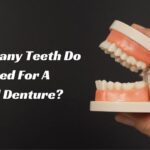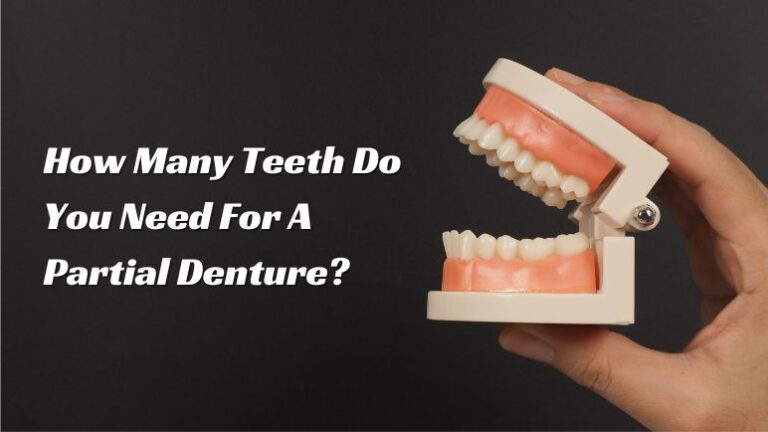Nowadays, a trending question is “How many teeth do you need for a partial denture?” Partial dentures are a common solution for individuals who have lost some of their natural teeth. Whether due to decay, injury, or other dental issues, partial dentures can restore functionality and aesthetics to the mouth.
The number of teeth required for a partial denture varies depending on individual factors such as overall dental health, the location of missing teeth, the type of partial denture chosen, and aesthetic considerations. A thorough evaluation by a qualified dentist is necessary to determine the optimal design and number of partials for missing teeth. By addressing these factors, individuals can enjoy restored dental function and a natural-looking smile with their partial dentures. However, one common question that arises is, “How many teeth do you need for a partial denture?” So, now we give you a clear conception about it.
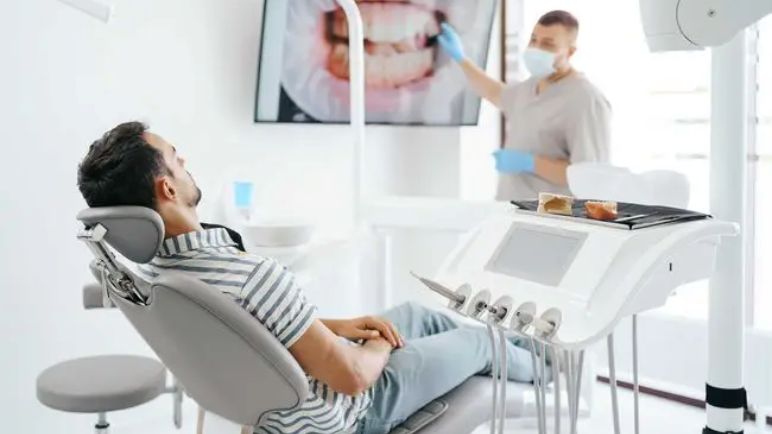
Importance of Teeth Replacement
The smile is often considered a person’s most significant facial feature, conveying joy, confidence, and warmth. However, when teeth are missing, this essential aspect of communication and self-expression can be compromised. Beyond aesthetics, missing teeth can lead to a host of functional and health issues, highlighting the importance of timely and appropriate teeth replacement.
1. Restoring Functionality
Teeth play a crucial role in the proper functioning of the mouth, including biting, chewing, and speaking. When even a single tooth is lost, it can disrupt the balance of the entire dental structure. This can lead to difficulties in chewing food properly, which may result in digestive issues and poor nutrition. Additionally, speech may be affected, leading to pronunciation problems and a decrease in confidence during social interactions.
2. Preserving Oral Health
Partial teeth replacement options such as dental implants can help stimulate the jawbone and prevent further bone loss. It helps to replace partial dentures for front teeth and lower partial dentures bottom front teeth. Unlike traditional bridges or dentures, implants mimic the natural tooth root, providing stability and support to surrounding bone and tissue. By preserving bone density and oral health, dental implants offer a long-term solution for individuals with missing teeth.
3. Enhancing Aesthetics and Confidence
Missing teeth can significantly impact a person’s appearance, leading to self-consciousness and a decline in confidence. Modern advancements in dentistry have made it possible to create prosthetic teeth that closely resemble natural teeth in color, shape, and function. This helps individuals regain their confidence. It will be possible by knowing the question how many teeth do you need for a partial denture?
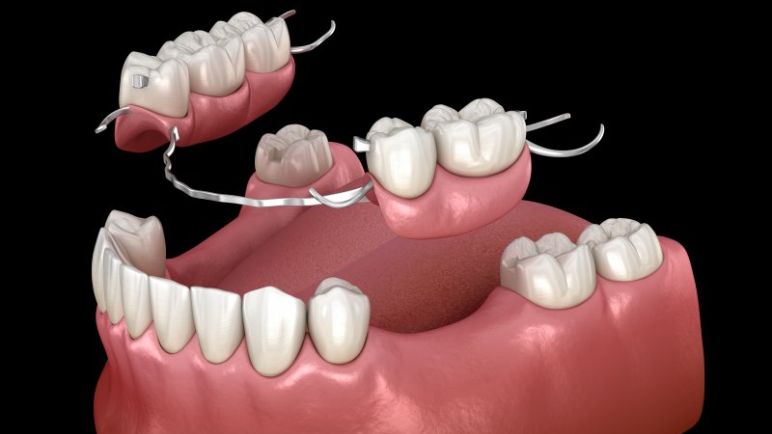
Types of Partial Dentures
Partial dentures are a common solution. It replaces missing teeth and offers both functional and aesthetic benefits. These are for top front tooth partial dentures, bottom teeth partials, partial dentures bottom front teeth, etc. There are several types of partial dentures tailored to meet individual needs.
- Constructed with a metal framework for durability and stability, these dentures are lightweight and thin, making them comfortable to wear.
- Made entirely of acrylic resin, these dentures are more affordable and easily customizable in terms of color and shape. However, they may be less durable than metal-based options.
- Crafted from a flexible, lightweight material, such as nylon, these dentures offer superior comfort and aesthetics. They adapt well to the mouth’s contours and are less likely to irritate.
- Secured in place with dental implants, these dentures provide a stable foundation and prevent bone loss. They offer the closest resemblance to natural teeth and enhance chewing efficiency. It conveys some clarification of the question how many teeth do you need for a partial denture?
Functionality of Partial Dentures
Partial dentures play a crucial role in restoring oral functionality and aesthetics for individuals missing some teeth. These removable dental appliances are custom-made to fit comfortably in the mouth, filling in the gaps left by missing teeth. Functionality-wise, partial dentures offer several benefits.
Firstly, they aid in chewing, allowing individuals to properly break down food for digestion. This enhances their ability to maintain a balanced diet and overall health. Additionally, partial dentures help maintain the proper alignment of remaining teeth by preventing them from shifting into empty spaces. This ensures a more even bite and reduces the risk of dental complications such as overcrowding or misalignment.
Furthermore, partial dentures can improve speech by providing support to the lips and tongue, helping individuals pronounce words. Overall, partial dentures not only restore the appearance of a natural smile but also contribute significantly to oral function and well-being.
Factors Influencing the Number of Teeth Required
The number of teeth in the human mouth varies widely from person to person. While the adult human mouth typically houses 32 teeth. It depends on genetics, oral health, dental hygiene practices, and lifestyle choices.
- Genetics plays a significant role in determining the number of teeth a person will have. Some individuals may inherit genes that predispose them to have fewer teeth or to experience specific dental issues that can affect tooth count.
- The development of teeth begins before birth and continues throughout childhood and adolescence. Conditions such as ectodermal dysplasia or cleft lip and palate can impact tooth development and result in fewer teeth than usual.
- Poor dental hygiene can lead to tooth decay, gum disease, and eventual tooth loss. Inadequate brushing and flossing, along with infrequent dental check-ups, can contribute to the need for extractions and ultimately reduce the total number of teeth in the mouth.
- Accidents, injuries, or trauma to the mouth can result in the loss of one or more teeth. Additionally, injuries sustained during sports or other physical activities can cause tooth fractures or avulsion.
- Tobacco use, excessive alcohol consumption, and poor dietary habits can increase the risk of gum disease and tooth decay, ultimately leading to tooth loss.
- Various dental treatments, such as orthodontic procedures or restorative dentistry, can also influence the number of teeth in the mouth. Orthodontic treatment may involve the extraction of overcrowded or misaligned teeth to create space and achieve proper alignment.
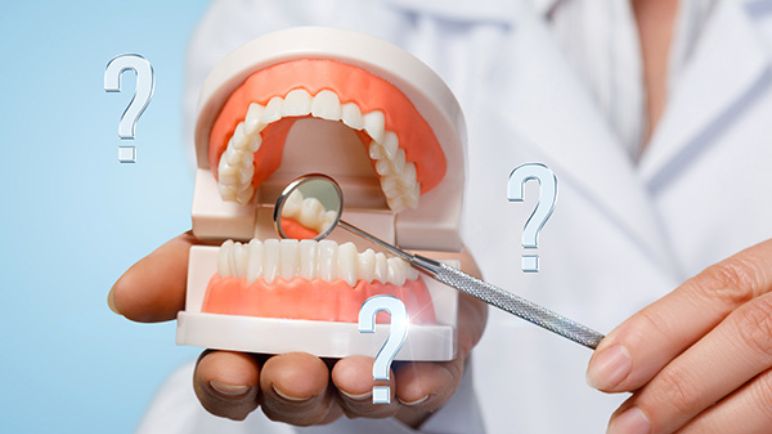
How Many Teeth Do You Need For a Partial Denture?
Partial dentures are dental appliances used to replace missing teeth. The number of teeth needed for a partial denture varies depending on the individual’s situation. Typically, a partial denture requires at least one natural tooth on either side of the gap to anchor the appliance securely in place. However, the number of teeth needed can vary based on factors such as the size of the gap, the health of the remaining teeth, and the patient’s preferences. For this replacement, you must know the question how many teeth do you need for a partial denture?
In some cases, a dental bridge may be a better option for replacing missing teeth if there are enough healthy teeth adjacent to the gap. A dental professional can assess your specific needs and recommend the most suitable treatment option for you. It can help to replace your partial dentures lower front teeth and partial bottom false teeth.
Ultimately, the goal of a partial denture is to restore functionality and aesthetics to your smile while also preserving the health of your remaining teeth and supporting structures. If you have missing teeth and are considering a partial denture, consult with your dentist to determine the best course of action for your oral health needs.
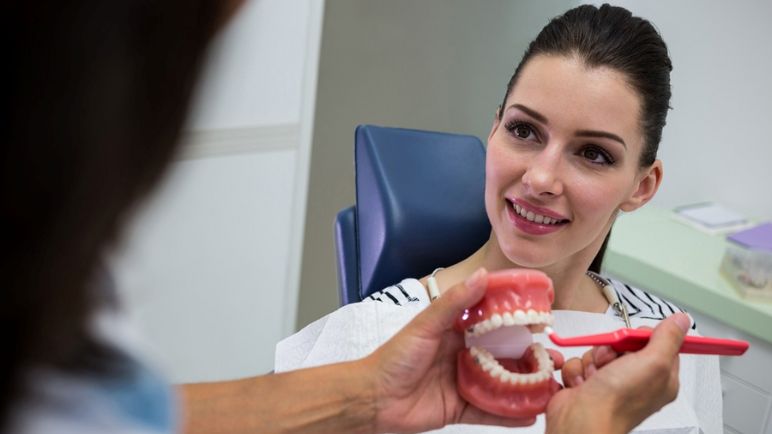
Benefits of Partial Dentures
Partial dentures are a valuable dental solution for those missing some teeth. It offers a range of benefits that contribute to improved oral health and overall well-being.
- One of the primary advantages of partial dentures is their ability to restore the natural function of missing teeth. By filling in gaps in the dental arch, partial dentures enable individuals to chew food more effectively, improving digestion and overall nutrition.
- This is crucial for maintaining proper dental alignment and bite function. By stabilizing the remaining teeth, partial dentures reduce the risk of further tooth loss and the development of oral health issues.
- Missing teeth can impact one’s appearance and self-confidence. This restoration of a complete smile can significantly improve an individual’s self-esteem. It allows them to smile, and speak, with confidence.
- Modern partial dentures are crafted using advanced materials and techniques, making them lightweight, durable, and comfortable to wear. Dentists design partial dentures that meet their patient’s aesthetic preferences and functional needs, resulting in a personalized solution that enhances comfort and satisfaction.
- Compared to other tooth replacement options such as dental implants or fixed bridges, partial dentures are often more cost-effective. Partial dentures can be adjusted or repaired as needed.
- Partial dentures help support facial tissues and maintain proper facial contours, preventing premature aging and preserving a youthful appearance.
Conclusion
In conclusion, we clarify your doubt on the question how many teeth do you need for a partial denture? By restoring chewing ability, preserving remaining teeth, enhancing aesthetics, and providing comfort and affordability, partial dentures are a valuable dental solution that can help individuals regain confidence in their smiles and enjoy better overall oral health. From this article, you also have a clear conception of what is a dental partial.
Partial dentures offer a range of benefits that contribute to improved oral health, functionality, and quality of life for individuals missing some teeth. The number of teeth can be influenced by genetic, developmental, environmental, and lifestyle factors. If you are considering tooth replacement options, consult with your dentist to determine if partial dentures are the right choice for you.


